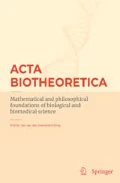Notes
See Weinberg (1985): “invisible, submicroscopic agents … can explain, at one essential level, the complexity of life”.
It must be however remarked that the discovery of TSG, shocking as it initially was, didn’t actually but confirm the original insight by Boveri, as remarked by H. Harris (see Boveri 2008, with Harris’ introduction; Coffman 2006). In the same paper, Boveri raises an interesting concern: “My own view is that the assumption that there is a specific inhibitory apparatus is less probable than the idea that the total chromosome complex of a tissue cell is so attuned to the influences of the rest of the body that, so long as there is no change in these influences, cell division is restrained. Cell division, it seems to me, takes place when a change in the environment has such an impact on the chromosome complex that it loses its customary equilibrium” (Boveri 2008). Boveri seems to have still much to say about a multilevel understanding of cancer’s causality, while his canonization as the pioneer of molecular-genetic reductionism in cancer research may have been the outcome of a too hasty “intertheoretical reduction” between the chromosome theory of heredity and molecular genetics.
References
Abbott A (2003) Biology’s new dimension. Nature 424:870–872
Baker SG, Kramer BS (2007) Paradoxes in carcinogenesis: new opportunities for research directions. BMC Cancer 7:151
Bedessem B, Ruphy S (2015) SMT or TOFT? How the two main theories of carcinogenesis are made (Artificially) incompatible. Acta Biotheor 63:257–267
Bertolaso M, Dupré J (2018) A processual perspective on cancer. In: Dupré J, Nicholson D (ed) Everything flows. Towards a processual philosophy of biology. Oxford University Press, Oxford
Bizzarri M, Cucina A (2016) SMT and TOFT: why and how they are opposite and incompatible paradigms. Acta Biotheor 64:221–239
Boveri T (2008) Concerning the origin of malignant tumours (1914), translated and annotated by H. Harris. J Cell Sci 121:1–84
Breslauer DN, Lee PJ, Lee LP (2006) Microfluidics-based systems biology. Mol Biosys 2:97–112
Coffman JA (2006) On reductionism, organicism, somatic mutations and cancer. BioEssays 27:459
Domazet-Lošo T, Tautz D (2010) Phylostratigraphic tracking of cancer genes suggests a link to the emergence of multicellularity in metazoan. BMC Biol 8:66
Fearon ER, Vogelstein B (1990) A genetic model for colorectal tumorigenesis. Cell 61:759–767
Fell HB (1972) Tissue culture and its contribution to biology and medicine. J Exp Biol 57:1–13
Griffiths PW, Stotz K (2013) Genetics and philosophy. Cambridge University Press, Cambridge
Grobstein C (1963) Microenvironmental influences in cytodifferentiation. In: Allen JM (ed) The nature of biological diversity. McGraw-Hill, New York
Harris H (2005) A long view of fashions in cancer research. BioEssays 27:833–838
Jacks T, Weinberg RA (2002) Taking the study of cancer cell survival to a new dimension. Cell 111:923–925
Karnoub AE, Dash AB, Vo AP, Sullivan A, Brooks MW, Bell GW, Richardson AL, Polyak K, Tubo R, Weinberg RA (2007) Mesenchymal stem cells within tumour stroma promote breast cancer metastasis. Nature 449:557–563
Kinzler KW, Vogelstein B (1997) Gatekeepers and caretakers. Nature 386:761–763
Malaterre C (2007) Organicism and reductionism in cancer research: towards a systemic approach. InternatStud Philos Sci 21:57–73
Mikkers H, Frisén J (2005) Deconstructing stemness. EMBO J 24:2715–2719
Morange M (2007) The field of cancer research: an indicator of present transformations in biology. Oncogene 26:7607–7610
National Center for Health Statistics (2017) Health, United States, 2016: with chartbook on long-term trends in health. National Center for Health Statistics, Hyattsville
Noble D (2012) A theory of biological relativity: no privileged level of causation. Interface Focus 2:55–64
Prehn RT (1994) Cancers beget mutations versus mutations beget cancers. Cancer Res 54:5296–5300
Rather LJ (1978) The genesis of cancer. A study in the history of an idea. John Hopkins University Press, Baltimore
Simian M, Bissell MJ (2017) Organoids: a historical perspective of thinking in three dimensions. J Cell Biol 216:31–40
Soto AM, Sonnenschein C (2006) Emergentism by default: a view from the bench. Synthese 151:361–376
Soto AM, Maffini MV, Sonnenschein C (2008) Neoplasia as development gone awry: the role of endocrine disruptors. Int J Androl 31:288–293
Takebe T, Zhang B, Radisic M (2017) Synergistic engineering: organoids meet organs-on-a-chip. Cell Stem Cell 21:297–300
Vaux DL (2011) In defense of the somatic mutation theory of cancer. BioEssays 33:341–343
Weinberg RA (1985) The molecules of life. Sci Am 253:48–57
Weinberg RA (2014) Coming full circle—from endless complexity to simplicity and back again. Cell 157:267–271
Author information
Authors and Affiliations
Corresponding author
Rights and permissions
About this article
Cite this article
Caianiello, S. A Possible Role for Philosophy: Bridging the Conceptual Divide in Cancer Research. Acta Biotheor 66, 243–250 (2018). https://doi.org/10.1007/s10441-018-9326-y
Received:
Accepted:
Published:
Issue Date:
DOI: https://doi.org/10.1007/s10441-018-9326-y

